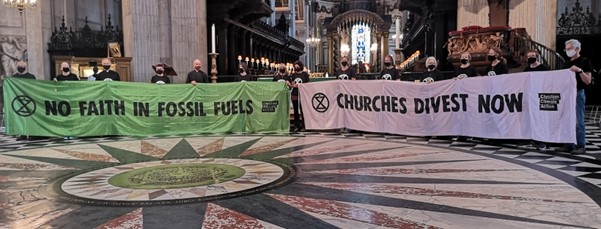 Divestment from fossil fuels
Divestment from fossil fuels
The Diocese of Bristol has divested from fossil fuels, divestinging from holdings in coal, oil and gas. Alongside the Diocese of Oxford, it was the first CofE diocese to announce the divestment.
Divestment is an important strategy for addressing climate change and promoting sustainable practices. It involves the removal of investments from companies or industries that contribute to climate change or biodiversity loss, such as investing in companies that are linked to fossil fuel extraction and production. It is important for churches, to recognise the significance of divestment as a way to align their financial resources with their values and environmental stewardship.
By divesting, churches can send a powerful message and contribute to the transition towards cleaner and more sustainable energy sources. Divestment campaigns have gained momentum globally, with numerous institutions divesting billions of pounds from fossil fuels. Whole countries have even started to divest from fossil fuels, Ireland being the first in 2018.
Furthermore, simply divesting is not enough; it is equally crucial to actively invest in initiatives and organisations that promote sustainability. This could involve supporting renewable energy projects, green technologies, sustainable agriculture, or socially responsible businesses. By investing in these areas, churches can utilise their financial resources to support positive environmental and social outcomes.
Engaging with financial advisors and experts in sustainable finance can provide valuable insights and guidance in aligning investment decisions with environmental goals.
 Ethical banking
Ethical banking
How to know what is ‘ethical’ and how to switch
Ethical banking refers to the practice of depositing and investing money in financial institutions that align with specific social, environmental, and ethical principles. For parishes and other church groupings interested in ethical banking, here are some steps to consider:
Make the switch: Once you have identified an ethical bank that aligns with your criteria, initiate the process of switching your accounts. Contact the chosen institution and inquire about the steps required to open new accounts or transfer existing ones. They will guide you through the necessary procedures, including transferring funds and updating direct debits or standing orders.
Communicate with your community: Inform your parishioners and church members about the transition to ethical banking. Explain the reasons behind the decision, emphasizing the alignment with your shared values and the positive impact it can have. Encourage them to support and participate in the ethical banking initiative.
Find out more about the Church of England's Ethical Investment Advisory Group here